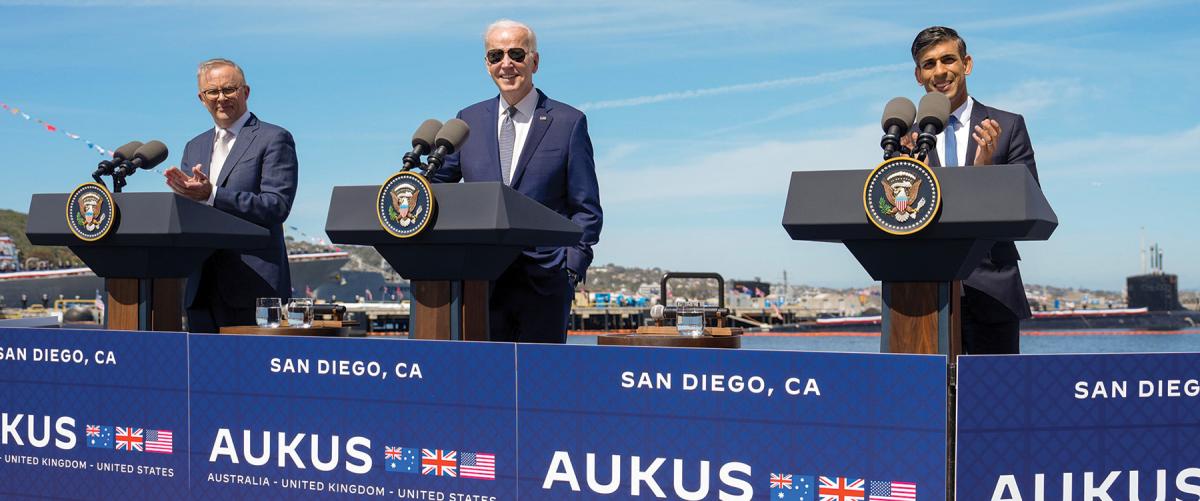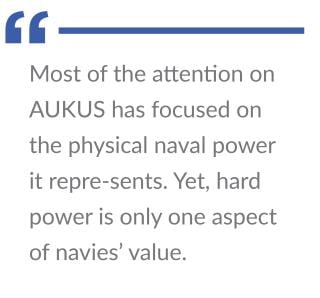The value of navies is found not just in their cumulative tonnage, but also in the placement of their naval power in a broader diplomatic and political construct. The AUKUS accord among Australia, the United Kingdom, and the United States is the strongest and most illustrative example.
Under the multiphase AUKUS agreement, the United States will begin rotating up to four Virginia-class submarines through Australia as early as 2027. They will be joined by the deployment of an Astute-class submarine from the U.K. Eventually, Australia will own, operate, and be able to build conventionally armed nuclear-powered submarines.1
For its part, the U.K. will secure access to more advanced technology for its next-generation submarines. The United States will forward deploy additional naval capabilities and, more important, increase its ability to sustain maritime operations in the Indo-Pacific with what amounts to a “full-service submarine garage in Asia-Pacific.”2
Most of the attention on AUKUS has focused on the physical naval power it represents. Yet, hard power is only one aspect of navies’ value, and alone it can be insufficient to deter adversaries. Indeed, U.S. naval presence did not dissuade Beijing from seizing and building out coral atolls and islets in the South China Sea.
The true value of AUKUS is what underpins the agreement and what it represents: political resolve and will, paired with the diplomatic, economic, technological, and intelligence foundations on which the accord is built.
The AUKUS accord includes technology transfer and information-sharing agreements and other measures that will deepen already close relationships among Canberra, London, and Washington. As Gideon Rachman recently wrote, AUKUS “is not a grand philosophical statement like the Atlantic Charter,” but “the nations of the ‘Anglosphere’ are renewing their alliance—this time to counter China’s efforts to gain naval dominance in the Pacific.”3
The partnership builds resilience and deterrence through increased and enhanced capacity. At every stage of the accord, from the technology transfers and joint engineering to the duration, size, and scale of the agreement, the three partner countries demonstrate the intrinsic value of this broader “fleet in being” to allies and adversaries alike.
The accord’s duration and scope alone carry significant weight—lasting well into the 2040s, this commitment is a signal to Beijing or any other would-be adversary. The long-term capital investment by all three countries (upward of $368 billion for Australia alone) attests to collective political will.4 While it remains to be seen whether the political will will be sustainable over successive governments, it illustrates the long-term planning shared by all three countries, a key component of deterrence.
This commitment also sends a signal to both active and potential partners in the region, whose support in the event of a crisis with China will be vital. With AUKUS, the United States is committing to deterrence in the region, something that increasingly was questioned, particularly under previous administrations. The value of this signal should not be underestimated and should help support the creation of a growing set of interlocking agreements, accords, and measures of like-minded countries.
AUKUS is, ultimately, of much greater significance and utility than the submarines alone suggest. The deepening of an existing allied relationship founded on a shared threat perception and shared values, the long-term commitment of resources and show of political will, and the resulting interoperability and increased resilience carry much greater deterrent value. Indeed, this naval accord demonstrates a credible capability and clear political intent in the Indo-Pacific, both now and increasingly as AUKUS comes to fruition.
1. Hon. Ben Wallace, Secretary of State for Defence, The AUKUS Nuclear-Powered Submarine Pathway: A Partnership for the Future (UK: Ministry of Defence and Defence Nuclear Organisation, 14 March 2023).
2. Megan Eckstein, Joe Gould, and Sebastian Sprenger, “In AUKUS, Navy Eyes a Full-Service Submarine Garage in Asia-Pacific,” Defense News, 9 March 2023.
3. Gideon Rachman, “AUKUS, the Anglosphere and the Return of Great Power Rivalry,” The Financial Times, 13 March 2023.
4. Daniel Hurst and Julian Borger, “AUKUS: Nuclear Submarines Deal Will Cost Australia up to $368bn,” The Guardian, 13 March 2023.




